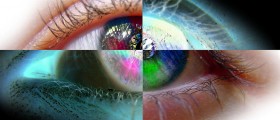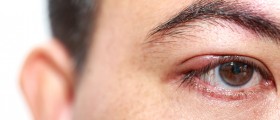
The thyroid gland can be affected by two kinds of conditions, the ones that increase the production of thyroid hormones and conditions associated with lack of thyroid hormones due to their inadequate synthesis. Graves' diseases is an autoimmune disorder affecting the thyroid gland, connected with hyperproduction of thyroid hormones. The effects of this disorder on many organs and organs system occur due to the presence of excess thyroid hormones in the blood. However, in case of Graves' eye disease there is something else responsible for characteristic eye changes.
Graves' Eye Disease - the Cause
Even though the primary changes affect the thyroid gland, patients suffering from Graves' disease may end up with characteristic eye problems.
The condition is thought to be connected with excess of thyroid hormones, but it seems that there is some connection between the presence of autoantibodies in the blood, which are apart from attacking the thyroid gland also blamed for inflammation of the connective tissue behind the eyeballs. Also, these antibodies may attack muscles that move the eyes in different directions and cause eye problems as well. In such patients the eyeballs protrude and this clinical presentation is known as proptosis or exophthalmos.
Graves' Eye Disease Symptoms and Signs
Apart from characteristic eye protrusion, patients suffering from Graves' eye disease may also have swollen and puffy eyelids, complain about gritty and burning sensation in the eyes, double vision, decreased vision, reduced brightness of colors and difficulty in completely closing the eyelids. The last problem may cause dryness of the eyes, especially during sleep and associated problems. Redness and swelling of the conjunctiva may occur as well.
As for eye muscles, the affected ones are congested and stiff. They are blamed for double vision because they simple cannot control the movement of the eyeballs due to edema and later scarring.
Inability of one to close the eyelids completely may eventually initiate corneal damage such as inflammation and sometimes even corneal ulcers.
And finally, severe swelling of the orbital fat and connective tissue may trigger glaucoma.
Graves' Eye Disease Treatment
Not all patients will end up with Graves' eye disease. Those in whom the condition cannot be controlled and who have already developed severe exophthalmos require drop lubricants (tear supplements) and pressure dressing which covers the eyes. Some patients also tape their eyes in order to prevent corneal damage.
There are several surgical procedures that may help these individuals restore closure of the eyelids (e.g. surgical orbital decompression ). Steroids medications and radiation therapy are also proven to be efficient for this medical condition.

















Your thoughts on this
Loading...